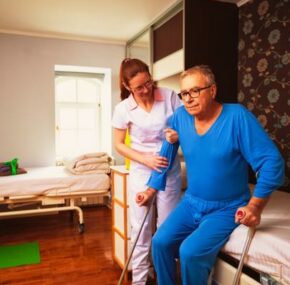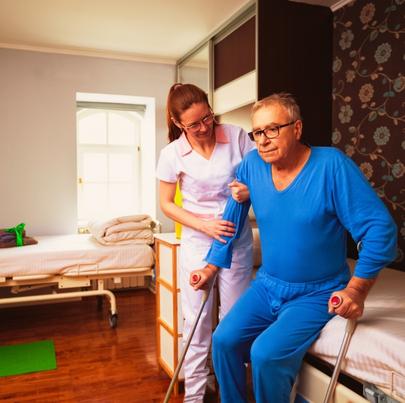Prolonged periods of immobility can lead to death for elderly nursing home residents. Many residents have health conditions that prevent even the most basic activities.

(Article continues below infographic)

______
Common Causes of Immobility
Elderly nursing home residents often have health issues that limit their movements and interfere with essential activities like eating, bathing and walking. When residents are bedridden or confined to a wheelchair, they become immobile and forced into a sedimentary lifestyle that often leads to death at a faster rate.
Immobility in nursing homes is often seen in elderly residents. It can result from a variety of common conditions including:
- Falls that result in broken bones and fractures
- Muscle and joint pain from osteoporosis and arthritis
- Malnutrition
- Depression and anxiety
- Parkinson’s disease
- Alzheimer’s disease and dementia
Dangers for Nursing Home Residents
Immobility commonly leads to other serious health conditions in the elderly. A nursing home abuse lawyer sees many cases of bedsores, hygiene problems, and unsanitary living conditions that are caused by lack of mobility in nursing home residents. Due to inadequate daily activity, failing health, compromised immune systems, and over-medication these conditions often accelerate death for many elderly nursing home residents.
Musculoskeletal
Immobility leads to a deterioration of the muscles and bone loss. As muscles begin to atrophy, elderly residents don’t want to move around due to discomfort and pain, weakness, and fatigue. This combination of symptoms often results in serious falls with bruises and contusions, fractures, and broken hips that make immobility an even bigger problem.
Respiratory
Immobility has a big impact on the heart and lungs. Lower activity levels often result in shallow breathing which can contribute to pneumonia and fluid build-up in the lungs, a common health concern in the elderly. Insufficient daily activity can cause the heart to shrink, resulting in chronic heart disease, higher blood pressure, and circulation problems.
Gastrointestinal
Some of the most common health problems that arise from immobility in the elderly impact the gastrointestinal system. Lack of activity and movement often contribute to constipation and bowel blockage, which can lead to malnutrition, intestinal and stomach infections, and death, if infections are left untreated.
To improve mobility, many nursing home facilities are implementing walking programs. Studies show that these programs build up muscle strength, decrease joint pain and stiffness, improve circulation, and increase balance. Residents who participate show increased socialization skills, improved cognitive functions, and higher self-esteem and self-confidence levels.







